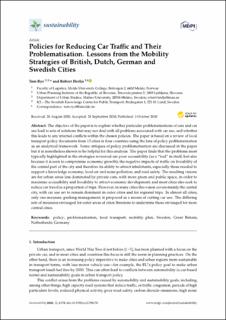Policies for reducing car traffic and their problematisation : lessons from the mobility strategies of British, Dutch, German and Swedish cities
Peer reviewed, Journal article
Published version

Åpne
Permanent lenke
https://hdl.handle.net/11250/3097287Utgivelsesdato
2020Metadata
Vis full innførselSamlinger
- Artikler [396]
- Publikasjoner fra Cristin [413]
Sammendrag
The objective of the paper is to explore whether particular problematisations of cars and car use lead to sets of solutions that may not deal with all problems associated with car use, and whether this leads to any internal conflicts within the chosen policies. The paper is based on a review of local transport policy documents from 13 cities in four countries using the lens of policy problematisation as an analytical framework. Some critiques of policy problematisation are discussed in the paper but it is nonetheless shown to be helpful for this analysis. The paper finds that the problems most typically highlighted in the strategies reviewed are poor accessibility (as a “bad” in itself, but also because it is seen to compromise economic growth); the negative impacts of traffic on liveability of the central part of the city and therefore its ability to attract inhabitants, especially those needed to support a knowledge economy; local air and noise pollution; and road safety. The resulting visions are for urban areas less dominated by private cars, with more green and public space, in order to maximise accessibility and liveability to attract economic development; and most cities also seek to reduce car travel as a proportion of trips. However, in many cities this vision covers mainly the central city, with car use set to remain dominant in outer cities and for regional trips. In almost all cities, only one measure, parking management, is proposed as a means of cutting car use. The differing sets of measures envisaged for outer areas of cities threatens to undermine those envisaged for more central cities. Keywords: policy, problematisation, local transport, mobility plan, Sweden, Great Britain, Netherlands, Germany
